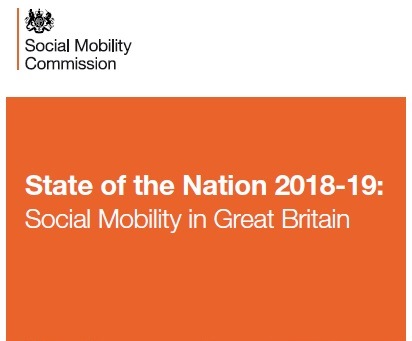The Social Mobility Commission (SMC) has published its most recent ‘state of the nation report‘, in which it concludes that social mobility in England is stalled. It provides evidence to support this claim, and then goes on to consider a number of reasons for this stagnation, with recent changes in the education system being the largest.

Their analysis encompasses adult learning, where the Commission has a number of criticisms of current policy as well as constructive suggestions for the future. Some of these come in discussions of other educational sectors; their discussion of early years education, for instance, looks at qualifications and career structures for the (overwhelmingly female) workforce, and at the importance of family learning in giving small children a strong start; the section on further education also looks at teacher recruitment issues.
When it comes to adult education and training, the Commission draws heavily on its own study of the adult skills gap, which it issued in January 2019. This showed that the least skilled are the least well placed to access opportunities for upskilling, at a time when the fourth industrial revolution is starting to impact most on the least skilled jobs.
The most highly educated, meanwhile, find it relatively easy to refresh their skills and qualifications. The report notes that this appears to be as true of open education programmes such as MOOCs as it is of more conventional opportunities. The consequences, if things are left as they are, will be that adult learning serves as a block to social mobility rather than an enabler.
And all of this following a period in which, as the Commission notes, ‘almost all forms of adult education are in decline’. They produce figures showing that the UK spends two-thirds of the EU average on adult training, well below that of such comparable economies as Germany and France. They show that regional imbalances increase problems of accessing training, and note that those who are most likely to move between regions are the most advantaged. While the new national retraining scheme for England may have potential, they note that it will need to be both large and highly targeted if it is to have the impact required.
While the SMC has no remit to improve social mobility in Wales and Scotland, it notes that while challenges remain, neither has seen the same stagnation as is evident recently for England. They note that the Scottish Government has reponded to a steep decline in on-the-job training with a £10m in-work training programme, while the Welsh Government’s employment policies include proposals for skills and training.
So far as England is concerned, the SMC’s main recommendation for adult learning is that the Government should follow the action plan set out in the SMC’s report in January 2019, and in particular that it should ‘equalise adult education funding with EU statistical averages and reduce the underspend of its adult education budget through more flexible funding structures’. The new regional combined authorities have powers to achieve greater flexibility, but it will be for national overnment to release additional spending.
Clearly, then, the report offer much to encourage those of us interested in adult learning. Of course it focuses largely on adult learning for or in work, but that is for the obvious reason that our occupations tend to shape our life chances. More seriously, the current obsession with Brexit among politicians of all colours probably means that the SMC’s report will have a marginal influence on policy in the immediate term.
But with several committees of inquiry beavering away currently on lifelong learning policy, the SMC has provided further evidence of the wider benefits and policy importance of adult learning. It also provides fresh food for lobbying and advocacy at local and regional level.
